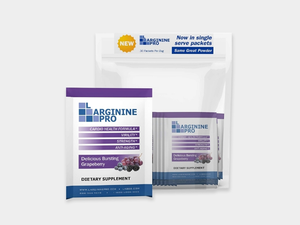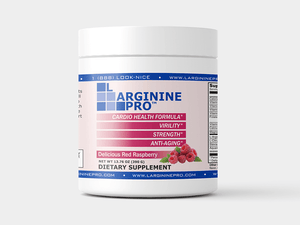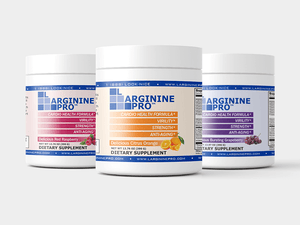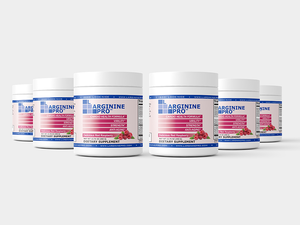Ingredients in L-Arginine
Supplement Facts
| Amount per serving | % DV* | |
|---|---|---|
| Calories | 15 | |
| Vitamin C (as ascorbic acid) | 60 mg | 100% |
| Vitamin D (as cholecalciferol) | 2,500 IU | 625% |
| Vitamin K (as phytonadione) | 20 mcg | 25% |
| Vitamin B6 (as pyridoxine HCI) | 2 mg | 100% |
| Folate (as folic acid) | 400 mcg | 100% |
| Vitamin B12 (as cyanocobalamin) | 6 mcg | 100% |
| Magnesium (as magnesium citrate) | 20 mg | 5% |
| L-Arginine | 5,500 mg | † |
| L-Citrulline | 1,100 mg | † |
| Stevia leaf extract | 125 mg | † |
| AquaMin™ (sea minerals) | 100 mg | † |
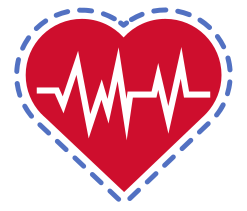
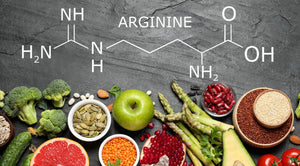
L-Arginine
Research notes avg/optimum amount per serving to be 5,000mg to receive meaningful heart benefits of more excellent nitric oxide creation. L-Arginine is a significant source of nitric oxide synthesis, relaxing the blood vessels and improving blood circulation, both of which are central to heart health.
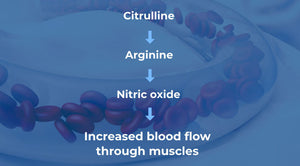
L-Citrulline
Clinical studies show that 1,100mg of L-Citruline acts as a catalyst, extending the body’s production of nitric oxide when combined with 5,500mg of L-Arginine per serving, extending the output of heart-healthy Nitric Oxide for up to 20 or more hours.

Vitamin C
Like Vitamin E, Vitamin C reduces oxidation in the blood vessels and may trigger an increase in nitric oxide. Studies have shown that people who intake high levels of Vitamin C will see a reduction in arterial plaque, which has been linked with higher levels of nitric oxide. Vitamin C is found abundantly in food, and supplements are convenient and easy to take. Recommended daily dosage is 500 mg daily.
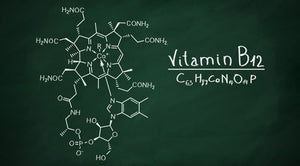
Vitamin B
Vitamin B12 is water-soluble and is needed to keep your nerves and red blood cells healthy. B12 also helps to regulate the nervous system, reducing depression, stress, and brain shrinkage. B12 is also needed to convert carbohydrates into glucose, leading to energy production thus decreasing fatigue and lethargy in the body. Vitamin B12 helps protect against cancers and guards against heart disease by improving unhealthy cholesterol levels and protecting against stroke, and high blood pressure. Vitamin B12 can be found only in foods derived from animals such as meats, fish, shellfish, liver, kidneys, eggs, milk, and oysters.
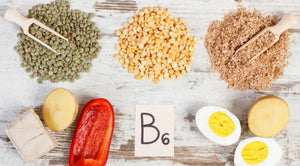
Vitamin B6 (Pyridoxine)
Food sources include pork, meats, whole grains and cereals, legumes, and green, leafy vegetables. Vitamin B6 aids in protein metabolism and red blood cell development. It is also involved in the body’s manufacture of chemicals such as insulin and hemoglobin. Fat-soluble vitamins A, D, E and K dissolve in fat before they are absorbed in the bloodstream to carry out their functions.

Vitamin D
Vitamin D is found in many dietary sources, such as fish, eggs, fortified milk, and cod liver oil and from 10 minutes a day of sun exposure. Vitamin D helps to regulate blood pressure, reduce respiratory infections, reduce stress and tension, relieve body aches and pains by reducing muscle spasms, aid in insulin secretion, helps in differentiation of the cells, helps fight depression, improves overall skin health making skin soft, strong, and smooth by reducing wrinkles, and improve cardiovascular strength by providing a protective lining for the blood vessels.
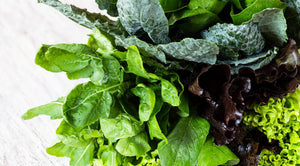
Vitamin K
Vitamin K is generally associated with blood clotting because it helps to arouse the proteins and calcium that allow your blood to clot. If you get recurrent nose bleeds, and have bleeding gums, you may have a vitamin-K deficiency. Vitamin K comes from green, leafy vegetables, especially iceberg lettuce, cabbage, turnip greens, cooked kale, collard greens broccoli, soybean oil, and spinach. Lower amounts occur in okra, asparagus, prunes and avocados. Vitamin K is also made by the healthy bacteria that reside in the human intestines.

AquaMin™
Aquamin provides bioactive calcium, magnesium and many other minerals. Derived from natural sea vegetation, it offers a unique absorption to ease the introduction of nutrients. Research has identified how Aquamin can enhance the quality of life in the areas of Bone, Joint, and Digestive Health.
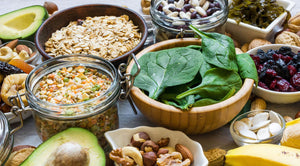
Magnesium
Natural dietary sources of magnesium include nuts, particularly almonds, wheat germ, fish, whole grains, and green leafy vegetables. Most importantly magnesium is linked with lowering the risk of coronary heart diseases. Other essential health benefits of magnesium include protein synthesis, improvement of parathyroid function, and relief from bronchospasm (constricted airways) in the lungs. Magnesium boosts the absorption of vitamin B6 and cholesterol, and prevents or treats high blood pressure, osteoporosis, insomnia, constipation, migraines, depression, kidney stones, gallstones, and improves muscle functioning.

Resveratrol
A study conducted by the High Desert Heart Institute revealed several important points. One, is that L-Arginine can produce potent good benefits within the body. Two, it indicated that other cardiovascular-friendly nutrients such as L-Citrulline and Resveratrol can synergistically increase L-Arginine’s benefits.
Get it now, feel great later



